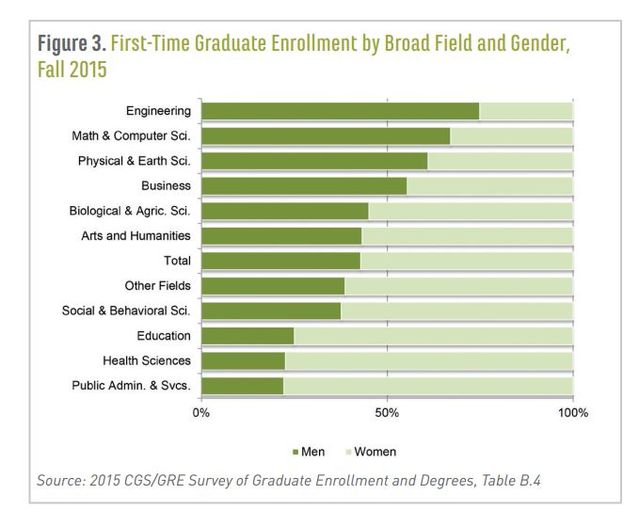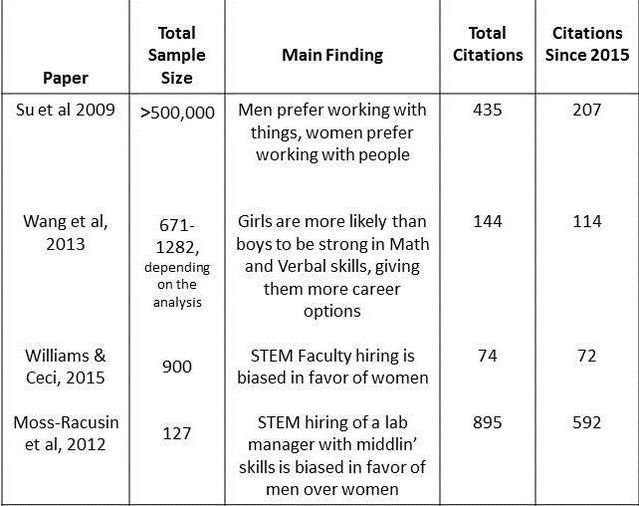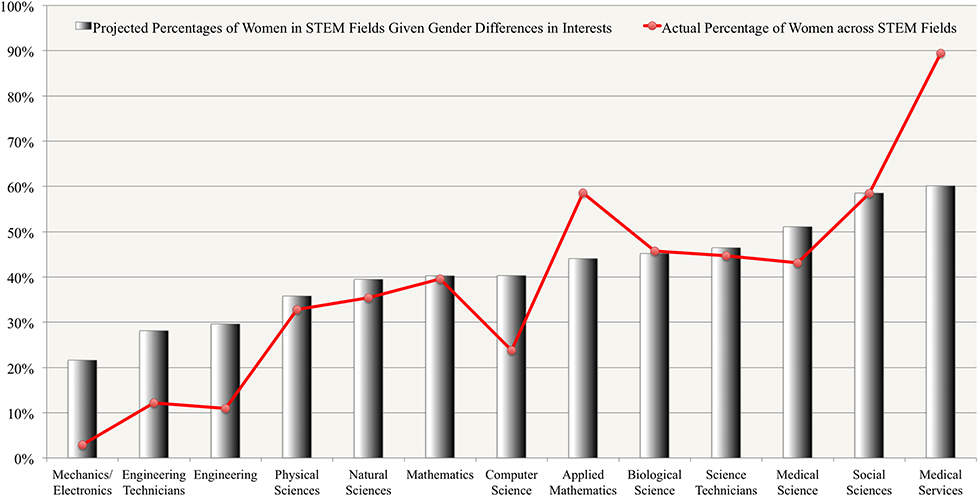Just saw this now because of the misquote. These aren't bullshit claims, maybe my wrong word choice made my intentions confusing. I apologise for that. To clarify, gender and sex are different things. You can talk about gender without commenting on sex, and vice versa. However, how my major beef with the current present "biological predisposition forming gender roles" conversation is multifaceted.
Yeah, sorry for the misquote, there's a lot of different things discussed at the same time which makes it hard to keep track. Gender identity and biological sex are two different things but they correlate to such a high degree, that a causal link simply cannot be brushed aside. In fact, not many thing in biology and psychology correlate to such a high degree.
1. Should biological predispositions be things we as a society actually should follow?
If we should follow them, is a philosophical value problem that unfortunately does not allow for a universally true answer. What we certainly cannot do, is vilify people who defend such a stance. What I can say for certain is that most political systems that ignored and/or disrespected fundamental human nature failed horribly.
The best example would be
communism. Making everybody equal may be a laudable goal in theory, but absolute equality makes people unhappy. According to
relative deprivation theory, humans tend to define happiness relative to their peers. This means that people are happier, when they feel that they are better off than other people and they feel unhappy when they are worse off. This explains the fact that happiness distribution in
poor countries is largely the same as in rich countries:
Relative deprivation offers a plausible explanation for the paradox that average happiness has remained constant or even fallen despite sharp rises in income.
If you make everybody the same, then nobody really feels happy or unhappy. Then of course there is also the fact that people feel happy when they are
rewarded for their hard work. In an absolutely equal society, like communism, making an effort does not make you happy, because you will never feel rewarded for working harder than other people. In that regard communism was not a tenable solution, because it simply failed to take into account human nature.
Now, I'm not making the case for unjust inequality, because if relative deprivation becomes too severe (i.e. the rich become richer and the poor become poorer), unhappiness will ultimately lead to civil unrest and destroy the social system (the French revolution would be such an example). But the way how humans perceive happiness would imply that some sort of healthy inequality is needed for societies to strive.
Please don't get me wrong, I'm not saying that women should be unequal to men (the example I stated does not pertain to gender difference). I'm merely saying that if certain differences are due to human nature, it would be counter-productive to engineer human society contrary to these biological predispositions. Yes, humans are to a certain extent rational beings, meaning that they can overcome their biological predispositions to a certain degree, but outright ignoring human nature makes them ultimately unhappy.
2. Biological predispositions don't account for other genders aside from the dominant 2.
As long as there is
equality of opportunity, everybody is free to shape their life according to their needs.
2. We have no way of measuring this or quantifying it or even providing strong casual links beyond vague theories...
Yes we do, there are many empirical studies,
like the one I linked above that manage to accurately measure the links between biological sex and gendered/vocational interests (here is a more palatable
summary):
Our study revealed substantial sex differences in vocational interests that parallel the composition of males and females in educational programs and occupations. Men and women differed by almost a full standard deviation in the Things–People dimension. This mean difference of 0.93 indicates that only 46.9% of the male and female distributions of interest on the Things–People dimension overlaps or that up to 82.4% of male respondents have stronger interests in things-oriented careers than an average female.
An effect size of 0.93 is insanely huge, if you consider that the smallest statistically significant difference is 0.2, medium is 0.5, and large is anything above 0.8. Just to give you an idea of how much these differences matter, here is an approximate visualization on
Cohen's d scale. They differ almost a full standard deviation (the distance between 0 and 1):

On the basis of findings from previous research and the present study, we suggest that interest may be a key factor in understanding individuals’ occupational choices as well as the gender disparity in the STEM fields. [...] Both sex differences in vocational interests and individual differences within the same sex should be taken into consideration to assist individuals in making the most suitable career decisions.
The present study makes several important contributions to the literature. First, it is the first comprehensive meta-analysis on sex differences in vocational interests. We synthesized evidence from interest inventories over four decades and found large sex differences in vocational interests, with men preferring working with things and women preferring working with people. These sex differences are remarkably consistent across age and over time, providing an exception to the generalization that only small sex differences exist. Second, this study provides a systematic review of the sex differences in the STEM interests that has not previously appeared in the literature. The pattern of sex differences in the STEM interests revealed by the present study closely resembles the composition of men and women in corresponding occupations and contributes to the understanding of the gender disparity in the STEM fields.
If we take biological gender differences pertaining to vocational interests and compare the to the number of women working in STEM, we get the following picture:
As we can see, gendered interests match occupational numbers very closely in most fields. The study found that percentages of women within most STEM fields to mirror closely the gender differences in basic interests. Which would support the preference-based explanation for gender disparities in STEM careers. The reason why so few women are in engineering, is partly because gendered interests diverge the most in these fields:
Large to very large gender differences in interests favoring men were observed in engineering-related fields (d = 0.83 for Engineering—professional level, d = 0.89 for Engineering Technicians, and d = 1.21 for Mechanics and Electronics). [...] Small to moderate gender differences in interests favoring men were observed for mathematical careers (d = 0.38 for Mathematics, and d = 0.23 for Applied Mathematics). Gender differences in interests vary largely in the sciences, ranging from moderate, favoring men, in Physical Sciences (d = 0.56), to non-significant (d = 0.19 for Biological Science, d= 0.14 for Science Technicians, and d = −0.04 for Medical Science), and to small to moderate, favoring women (d = −0.33 for Social Sciences, and d = −0.40 for Medical Services).
The study notes that the reason for that could also be gendered stereotypes (i.e. cultural influences). But you also have to take into account that, if given the opportunity, people tend to choose the field which match their strongest interests. So even if women have some kind of interest in mechanics, they still may have an even stronger interest in medical services. This would also explain why women are so over-represented in medical services, because they are a lot more people oriented than mechanics and electronics:
In addition to the inter-individual perspective, interest scores for different types of careers can also be examined within an individual to determine the career area with the highest interest. From this intra-individual comparison perspective, it is expected that individuals will choose the field in which they have the strongest interest, creating the possibility that individuals with high levels of STEM interests may still pursue careers in other fields because they have even greater interests in other areas. These intraindividual differences in interests may also contribute to gender disparity in the STEM fields, because the STEM areas are often perceived as a better match for individuals with things-oriented interests, and our results suggest that women are more likely than men to prefer working with people over working with things, and men are more likely than women to prefer working with things over working with people. Therefore, although an individual female may have high levels of STEM interests, she may still leave STEM areas because she has stronger interests in other people oriented areas.
[...] For example, in their 3-year interview study, Seymour and Hewitt (1997) found that perceptions that non-STEM academic majors offered better education options and better matched their interests was the most common (46%) reason provided by female students for switching majors from STEM areas to non-STEM areas. The second most frequently cited reason given for switching to non-STEM areas was a reported loss of interest in the women’s chosen STEM majors. Additionally, 38% of female students who remained in STEM majors expressed concerns that there were other academic areas that might be a better fit for their interests. Preston’s (2004) survey of 1,688 individuals who had left sciences also showed that 30% of the women endorsed “other fields more interesting” as their reason for leaving.
I really don't know how much more specific you can get. In case this is still '
too vague' for you, please show me any study that even manages to measure and/or quantify 'the patriarchy' in any perceivable way.
3. Biological predispositions is used, by some people, as a intellectual fill in for any gender difference where the reason for it isn't readily available, which is problematic for obvious reasons.
As you can see from the graphs presented above, there is still considerable overlap between men and women when it comes to their vocational interests. Nobody is arguing that biological predispositions are the end all be all to differences in STEM fields.
But what we certainly cannot do, is simply assume that these differences are mostly due to sexism and/or discrimination. Most people just look at percentages of women in a certain field and simply assume that there must be some kind of discrimination going on because the distribution is not 50/50. This is exactly the kind of reductive reasoning that people such as Peterson are complaining about.
Specifically, we argue that individuals' interests are powerful predictors of their occupational membership. Individuals are oriented toward work environments that are congruent with their interests. Men's and women's differences in basic interests lead to unbalanced gender composition in different sectors of the world of work. Realizing that the issue of women's underrepresentation is not identical across all STEM fields and the mechanisms contributing to the gender disparities are overlapping yet different is important for designing future investigations and interventions to understand and increase women's representation in STEM using a multivariate approach.
If you watch Peterson's video with Cathy Newman where he specifically talks about the
multivariate approaches, that's exactly in line with the conclusions of the above presented study.
On the contrary, these kind of studies allow us to
better understand these kinds of differences and
if we can find huge discrepancies between natural interest and actual occupation numbers, we can assume that other environmental factors are at play and start a reasoned investigation. But so simply screech about female oppression everywhere we can see these distribution differences, is simply ridiculous and ultimately counter-productive.
4. Also, People who tend to subscribe to a "Biological predispositions" theory tend to completely ignore or downplay socialisation, which has obvious problems.
As explained above, it is quite the contrary. If distributions don't match natural interests, we can safely assume that other factors are at play.
Importantly, not only the choices between STEM and non-STEM careers but also the choices within STEM careers reflect individuals' interest patterns. [...] In addition, findings from the current study highlight the discrepancies in some STEM fields where the number of women did not meet their level of interests, indicating other factors at work.
In that sense, these 'biological' studies actually help us understand possible inequalities
a lot better than abstract ideological notions that cannot even be measured. No evolutionary biologist or psychologist is making the case that we should simply accept these differences, but we should carefully intervene only when we understand them better and when they are not the result of people's individual choices. Otherwise you risk pigeonholing people into occupations that they don't want to find themselves in.
Again, radical ideologues merely refuse to take these biological explanations into account, because they largely contradict their oppression narrative. If you're truly interested in a more equal society, people would be wise to pay more attention to these findings instead of blindly following a political dogma.








